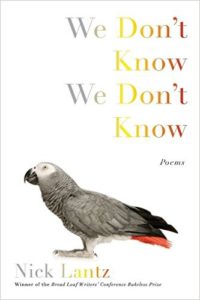We Don’t Know We Don’t Know
 by Nick Lantz,
by Nick Lantz,
Graywolf Press, 2010,
96 pages, paperback, $15.00,
ISBN: 978 -1 – 55597 – 552 – 4
Buy the Book
During the years of Bush the younger, you may remember, verse arose from an unlikely source: Secretary of Defense Donald Rumsfeld, whose evasive rationalizations for the war in Iraq were ironically, angrily circulated as “poetry.” Most infamous was his breakdown of intelligence into three categories: Known knowns, or what we know we know; known unknowns, the things we know we don’t know; and finally, the key to his defense: unknown unknowns — the ones we don’t know we don’t know.
The thing is, from a general ontological standpoint, the man’s right: There are limits to our understanding, so much so that we aren’t even aware we aren’t aware. The outrage of Rumsfeld’s formulation was that he used it to brazenly conceal the truth, rather than illuminate it — used it, you might say, in service to the dark side instead of the light. His notorious quote is one of two epigraphs that preface a fine first book by Nick Lantz, We Don’t Know We Don’t Know, winner of the 2009 Bakeless Prize.
In deeply empathetic poems, Lantz mulls on the confusion, chaos and fallacy that are so often mankind’s lot, and tries to raise them toward the light. In unlikely juxtapositions, he poses the hubris of Rumsfeld against the humility of, of all people, Pliny the Elder, ancient Roman author of Natural History and the source of this book’s other headlining observation, that man knoweth nothing unlesse he be taught. But we can learn our way against the darkness, Lantz thinks. Clear of voice and generous in spirit, We Don’t Know We Don’t Know is a volume both clever and very wise, its title at once riddle, lament, and mantra.
Lantz begins with a chapter of “Known Knowns.” In “Ancient Theories,” he lists “knowledge” dubious or disproved: Aristotle’s theory that frogs / formed from mud; the author’s childhood belief that the world spoke / in code through flashing streetlights. In “List of Things We Know,” he details arbitrary and questionable factoids (Kindness / is correlated / to detached / earlobes) and vertiginous exceptions to rules: Unlike most substances, water expands when frozen, and for this reason / . . . we can / go on living.
But beneath the bewildering fortuities, absurdities, and errors, there burns our persistent urge to understand and explain ourselves — to enlighten — and Lantz treats this desperate instinct lovingly, even as it falls short or fails again and again.
The failures are often ominous. The chapter “Known Unknowns” consists of one long poem called “Will There Be More Than One ‘Questioner’?” — a quote Lantz cites from the 1983 CIA Human Resource Exploitation Training Manual. What follows is a series of obsessive questions directed to an interrogator. Some questions are mundane (Have provisions been made for refreshments?), some are horrific (Will you have an unconscious man dragged past the open door at a pre – determined time?), and some hint at an involuntary intimacy (Will you think of him while you eat dark honey smeared on dark bread in a cafe?).
Haunting the “questioner” are the “known unknowns” of fear, dread, and uncertainty about how he will act and respond, how his prisoner will respond and act, and what will come of their humanity. Ironically, much in those unknowns — Will you risk everything to say [to the prisoner’s wife], He is alive, he is alive? / Will it be true? — is actually within the questioner’s power to decide.
Our very systems of knowing and expressing are inadequate in the chapter “Unknown Unknowns.” Language is insufficient: In “[ ],” Eve laments the birth of words and metaphors, how Adam pointed like a retarded child to name creatures and things. They grow smaller, Lantz writes, each time / she repeats their names. Truth is precarious, an ironic hazard: A verbal tic makes his aging mother preface her lies with in fact, which her parrot repeats over and over as infect.
But we also might know more than we know. To Rumsfeld’s three categories, Lantz adds a fourth: Unknown Knowns. There’s some redemption here, despite so much pathos and futility, as when in “The Sad Truth About Rilke’s Poems,” Lantz assures us that [i]n translation / something / of beauty always dies, but something also is carried over. In this poem, a purer appreciation of that something might call for a simple shift in awareness:
Too many
people close
their eyes to listen to your singing, as if it was the light
of the fire that burns
and not the heat at the heart of it.
The final, promising irony is that in exploring the limits of how we grasp that heat, we might, with a little work and grace, know better.
— Megan Grumbling

